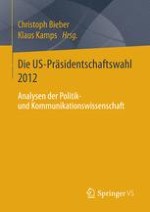2016 | OriginalPaper | Buchkapitel
May the Best Tweeter Win: The Twitter Strategies of Key Campaign Accounts in the 2012 US Election
verfasst von : Prof. Dr. Axel Bruns, Dr. Tim Highfield
Erschienen in: Die US-Präsidentschaftswahl 2012
Verlag: Springer Fachmedien Wiesbaden
Aktivieren Sie unsere intelligente Suche, um passende Fachinhalte oder Patente zu finden.
Wählen Sie Textabschnitte aus um mit Künstlicher Intelligenz passenden Patente zu finden. powered by
Markieren Sie Textabschnitte, um KI-gestützt weitere passende Inhalte zu finden. powered by
